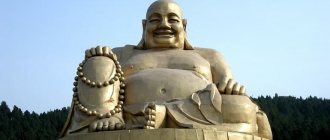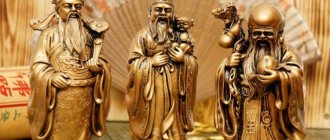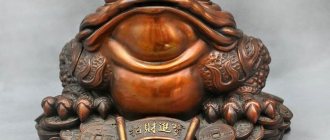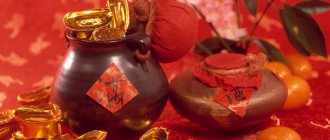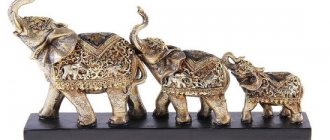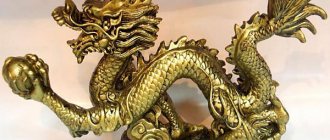After all, this is Buddha, right?
No, although you are looking in the right direction. Tourists could be forgiven for mistaking the ubiquitous figure for Buddha. By the way, that’s what they sometimes call her - Laughing Buddha. However, the story of the appearance of this cheerful fat man in the lotus position is almost as complex as Buddhism itself.
Denise Leidy is curator of Asian art at the Yale University Art Gallery and held the same position at the Metropolitan Museum of Art for 22 years. She is no stranger to confusion over the Laughing Buddha statue.
Where should I place the figurine?
Depending on what you want to achieve and what the Hotei figurine means, you need to place it in different places. For example, for general well-being, place the figurine near the front door on a hill. Hotei's face should be turned towards the door itself.
If you place Hotei in the southeast of the apartment, this will help attract early wealth. This could be an unexpected inheritance, a win, or the creation of your own profitable business. For those who dream of peace and tranquility in their home, place the figurine in the eastern zone. For people who dream of quickly having offspring, it is recommended to place the figurine in the western or southwestern zone of the house.
If you are a business person and you are worried about gossip behind your back and fear of the evil eye, place the figurine on your desktop. It will protect you from unwanted intrigues and help you in your career growth.
However, in addition to all the rules for the location of the figurine, the best place for it will be where attention and light will be drawn to it. This could be a shelf in the living room, a nightstand near the bed, or some other place of honor. Place Hotei where, in your opinion, he will be most comfortable, warm and light.
According to the rules of Feng Shui, it is allowed to place several figurines in different areas of the room. This will enhance the effect of all amulets.
God named Hotei
He didn't like to sit in one place. Tsi-Tsi traveled all over the world, visited shopping areas where there were a lot of people, and there was always noise. A rosary and a large canvas bag are the faithful companions of this monk. When asked what was in his bag, he answered: “The whole world rests in it.”
Wherever Tsi-Tsi appeared, fun reigned and laughter sounded. If he entered someone’s house, then money immediately began to appear in it, and happiness settled forever. From then on, people began to call him Hotei. Later, figurines were created in his honor, which became talismans for wealth, happiness and good luck.
There is another version of the origin of this god. According to Feng Shui, Hotei is Buddha-Maitreya. This god was very beautiful, cheerful and benevolent. No woman could remain indifferent to his beauty and cheerful disposition, so they often fell in love with him.
God could not reciprocate their feelings and thus he broke the ladies’ hearts. He felt sorry for the poor women, and then he made himself an elderly and fat god. In order to somehow console them, he gave them happiness and wealth. Since that time, Hotei began to be considered a god who brings prosperity and well-being.
God of happiness
Hotei is highly revered in China, in the practice of Feng Shui, but especially in Japan. According to local myths, he is considered one of the seven gods of happiness. He is very loved in the East, because he gives a rich, prosperous, happy, cheerful life, filled with communication with interesting people.
Buddha Hotei
It is called differently:
- Hotei - in Japanese;
- Budai - in Chinese.
The main companion of the laughing Buddha is a canvas bag, which in Japanese is translated as “ho tei”. This is where his name comes from.
Hotei is often called Buddha for some external resemblance to Shakyamuni Buddha and his statues. But from the point of view of Buddhist philosophy, they have nothing in common - Hotei comes from a different culture.
Hotei figurines are famous characters from the Japanese arts and crafts netsuke. They can be of different sizes: from quite large statues, for example, at the entrance to a store, to small keychains that fit in a pocket. But Hotei’s strength does not depend on size - he is always ready to give wealth and financial success to his owners.
In any oriental souvenir shop you can meet this kind fat man. Shop owners buy them to attract greater profits, and ordinary family people place them in their homes to find happiness, harmony and well-being. The area of activity of the Buddha of Abundance depends on which area of the apartment you place the figurine in.
In Chukotka there is an analogue of the god Hotei - he is called “peliken”. He also takes the form of a man with a kind smile and a huge belly, and his appearance in the house promises happiness and good luck to the owners.
Peliken - Chukchi mascot
Many Buddhas
“There’s only one guy in Christianity,” says Denise, “so when people see this funny fat guy, they think: “That’s Buddha!” But actually it is not. Buddha is Siddhartha Gautama, spiritual teacher and founder of Buddhism. But this religion has become somewhat complex over time and has added new deities, many of which can be depicted in different ways. Only crazy people like me,” adds Denise with a smile, “can devote their entire lives to studying these subtleties.”
The Buddha, Leidy mentioned, was a man named Siddhartha Gautama who lived in the 6th century BC in India. Born a wealthy prince, he decided to live as an ascetic in search of the meaning of existence, which he found by meditating for 49 days under the Bodhi tree.
False monks and other most ridiculous travel scams around the world
"King of the Rope" Nik Wallenda will walk over an active volcano on a tightrope
The groom danced cooler than Michael Jackson: what a newlyweds’ dance could be like
After achieving nirvana, which is the exit from the endless cycle of suffering, death and rebirth, Siddhartha Gautama became the Buddha (or "awakened one"). Over the centuries, his teachings spread to India, China and eventually became known throughout the world. Today there are approximately 376 million followers of Buddhism across the planet.
Figurine of the god of wealth
In Feng Shui, Hottei is depicted as a bald, laughing man with a big belly. He always holds a large bag in his hands. According to one version, it contains untold riches, and according to another, God takes away all the sorrows, misfortunes and other adversities from a person.
The Hotei figurine should be gold or white. It doesn't matter what material the figurine is made of. Clay, gypsum, stone chips, metal and wood are used to make it. The figurine can be any size.
The Hotei talisman can be of several types. He can sit on a toad, hold a fan in his hands, and so on. All this affects the meaning of the talisman.
Types of Hotei:
- Sitting on a three-legged toad. The three-legged toad is one of the most powerful money talismans in Feng Shui. This means that Hotei on a toad attracts money into the house more than an ordinary Hotei. This talisman is suitable for those who want to get rich quickly.
- On the dragon turtle. Such a talisman attracts money, helps to make connections necessary for business or work, and conclude profitable deals. Thanks to this Hotei, you can receive the patronage of influential people and make a profitable financial investment.
- In a pyramid with golden sand and coins. This talisman helps you build a successful career and focus on a specific task, and not waste your time on trifles.
- With a pearl. First of all, such a talisman attracts money, but it has another meaning. It promotes spiritual growth and opens the way to knowledge.
- With a fan. This netsuke attracts money, good luck and brings changes in life for the better.
- With ginseng staff, peach, bamboo or gourd. These talismans attract money and prolong life.
- With rosary - brings wealth and opens the way to knowledge.
- With a bowl, coins or gold bars. Such figures not only attract money, but also help you learn how to spend it wisely.
- With a rocker arm to which is attached a basket of gold bars and a lucky coin. This talisman attracts wealth, happiness and prosperity.
- With kids. Such a talisman helps a married couple have children, and also attracts money that helps raise and feed them.
The netsuke of the god Hotei should be placed in the area of the apartment or house that corresponds to what a person wants from this talisman. To honor respect, you need to place the figurine next to the front door indoors. God needs to be positioned so that he looks at the front door. If you place a figurine in the southern zone, it will help achieve recognition of a person's achievements.
A figurine of the god Hotei, placed in the south-eastern zone of the room, will attract wealth. It can help, for example, open a new source of income or win the lottery. If you place the figurine in the eastern zone of a house or apartment, it will bring harmony to the family. If you are traveling with children, it is recommended to place it in the western or southwestern zone of the room.
Hotei can make wishes come true. To do this, you need to stroke his belly clockwise 300 times, while thinking about your dream. Hotei's belly should be stroked before every exit from the house. It will attract good luck that will accompany you all day.
Although Hotei is the god of fun and wealth, he requires proper treatment. The space around him should always shine with purity, and God himself should stand in a place where others will admire him. Then he will be satisfied and will give the owners of the apartment, house and any other premises all kinds of benefits.
There are several types of Hotei figurines, which are supplemented with other characters or objects, and each has its own meaning. Knowing what each figurine contains, you can choose exactly the one that is needed in each specific case.
- If a woman dreams of having healthy children and wants to bring this day closer, usually in such cases she resorts to the help of a Hotei figurine surrounded by children.
- A cheerful god on a three-legged toad with a coin in his mouth enhances the effect of attracting wealth and prosperity. Both symbols are strong on their own, and together they will attract even more luck to the house.
- God on the dragon turtle will be a successful companion for those who often have to enter into contracts and formalize transactions. There will be even more profitable offers and reliable partners if you keep such a figurine at home. The turtle will help you make the right decisions, and the dragon will give you inner strength and teach you how to emerge victorious from any situation.
- Hotei in the pyramid, where golden grains of sand swarm, helps to concentrate on one main goal and achieve its implementation. Waiting for your desire to come true, of course, is pointless; you need to work on it. But a god with a pyramid can enhance the effect. The main thing is to believe in it.
- Hotei with a pearl in his hands helps a person develop in a spiritual direction and direct his thoughts in the right direction.
- A laughing Buddha with a rosary also instructs on the true path.
- A god with a fan will bring about changes in life. Happiness and joy will definitely come to your home. Moreover, well-being and success await in all areas, be it work or family.
- Hotei with coins or gold bars not only attracts money into the house, but also teaches its owner to use it wisely.
- A figurine with a staff will give not only material well-being, but also a long, happy life to its owner.
- The most common version of Hotei with a bag will always be a welcome guest in the house. Good luck and wealth will come from the generous bag of the smiling god, and troubles will bypass the house.
- The figurine of a cheerful fat man with a peach symbolizes health and longevity.
Top 6 rituals and ceremonies
For wealth:
It is performed when the god Hotei is previously placed in the south-eastern zone of the office, since it is this position that helps to become lucky in money. Every time before leaving home for work, especially before important meetings and negotiations, you need to rub Hotteya’s stomach, consistently increasing the number of revolutions day after day. Important: the ritual is not performed if the owner of the figurine is not feeling well or is in an unwell state of mind.
For all the blessings of life:
| Transliteration of Sanskrit | Russian transcription | Characteristic |
| AUM GAM GANAPATAYE NAMAH <…></…> | Om gam ganapataye namaha saranam ganesh | It has the power to encourage one to overcome all life’s obstacles and gives a person purity of intentions. |
For love:
| Transliteration of Sanskrit | Russian transcription | Interpretation |
| Jai radha madhav Jai kunj vihari Jai gopi jana vallabh Jai gire balihari | Jaya radha-madhava Jaya kunja-bihari Jaya gopi-jana-valabha Jaya giri-vara-dhari | Absolute perfection of life. |
Mantra for fulfilling wishes for health:
| Transliteration of Sanskrit | Russian transcription |
| OM TARE TU TARE TURE MAMA AH YUH PUNE JANA PUTIM KURU SOHA/SVAHA | Om tare tutare ture mama ayu punye jnana pushtim kuru soha |
Interpretation:
“Punye” or “punya”: a person’s merits in the moral field, capable of generating good karma.
Jnana or Gnana literally means wisdom.
"Pushtim" symbolizes the increase of something.
The name “Kuru” was borne by the legendary country, supposedly located north of the Himalayas. Also “kuru” is the imperative form of the verb “to do”, “to do”.
“Mom” is the reflexive form of the pronoun “I”. To wish health not only to yourself, but also to your loved ones, the name of another person should be placed in place of this word.
“Svaha” or “plow” is an enthusiastic exclamation, the meaning of which can be conveyed to our “so be it.”
Gayatri is a powerful mantra for fulfilling desires and goals.
| Transliteration of Sanskrit | Russian transcription | Interpretation |
| Oṃ bhūr bhuvaḥ svaḥ Tat savitur vareṇ(i)yaṃ Bhargo devasya dhīmahi Dhiyo yo naḥ pracodayāt. | Om bhur bhuvah swah tat savitur varenyam bhargo devasya dhimahi dhiyo yo nah prachodayat. | Awareness and acceptance of divine power, devotion and worship of the Creator. |
A universal ritual that allows you to get to know your patron better and ask him for what you want:
This is not carried out immediately after purchasing the figurine, but a few days later. Your request should be stated in detail and clearly in writing on a piece of paper. Laughing Buddha welcomes ironic writing because he loves cheerful people. A note folded into a small envelope should be tied with two threads, preferably red and gold. Begin the ritual of offering itself: light aromatic candles, sit relaxing in front of the figurine, after offering it some treats - for example, dried fruits, rice or nuts. All you have to do is put your note under the person you want and clearly imagine what you want in your head.
Who is this Laughing Buddha?
However, as Leidy pointed out, Buddhism has expanded over the millennia. It now includes a pantheon of deities in addition to Gautama Buddha. These include numerous bodhisattvas (a term denoting sages who work to enlighten all sentient beings).
And then there are the so-called avatars, people who are incarnations of deities. It turns out that the Laughing Buddha was one such avatar, a Chinese monk who lived in the 10th century. His name was Budai. According to accounts written centuries later, Budai was a gregarious, pot-bellied monk who wandered from village to village with a large sack slung over his shoulder. ("budai" means "cloth bag" in Chinese.)
Chicken soup with chili pepper and mint sauce. Chef's signature dish
Who is the woman in the picture in a relationship with: many find it difficult to answer
1978 Pontiac: Paul Zimmer's modification proves its superiority
He was loved by children and the poor, to whom he gave rice and sweets from his bag. On his deathbed, Budai wrote a poem in which he revealed himself as an avatar of Maitreya, a deity also known as the Future Buddha.
“In this great cosmic age that you and I share, there is a so-called teaching Buddha named Siddhartha Gautama, or Shakyamuni,” Leidy explains. “The world will ultimately destroy itself.” I do not know when. But one day the world will be reborn. And Maitreya will return as the teaching Buddha of that era.
Rituals for the talisman
In order for you to achieve all your plans, there are two main rituals performed with the amulet. To perform the first ritual, you should stroke the deity's belly clockwise 300 times. In this case, you need to concentrate and think about your desire all the time. Negative thoughts and negative emotions should not be allowed; there should only be good feelings and thoughts.
When communicating with the amulet, it is better to remain alone with the deity, not to be distracted, especially not to swear or scream. The second ritual is that when leaving the house, it is useful to stroke the fetish on the stomach every time. This will attract good luck and it will accompany you throughout the day.
From the material in the article it is clear that a talisman acquired by any person can radically and qualitatively change his life and the lives of people close to him for the better. The amulet will help many: scientists, entrepreneurs, people in need of housing, families who do not have but passionately desire to have children.
When purchasing a figurine, you need to think through your further actions down to the smallest detail. This means choosing the right place to place the figurine in your home, activating the amulet with pleasure with the participation of all family members, and clearly carrying out all rituals in relation to the fetish.
And then the Hotei figurine will reward you with its favor, will be happy to help you and attract the desired benefits - wealth, happiness, good luck, health!
Magnet of abundance
Over time, Budai became an object of devotion in Zen Buddhism in both China and Japan, where he goes by the name Hotei. Its large belly and pouch are believed to represent abundance. He is one of the seven lucky gods of Japan as a harbinger of prosperity and health.
At some point, he also became the patron saint of restaurateurs and bartenders, so it is not surprising that he can often be seen next to the cash register. Leidy is unsure of the exact historical origins of today's Laughing Buddha statues, but she believes that images of Budai began to appear in the 15th century.
Have you ever seen a figurine of this cheerful fat man?
How to make a wish on a figurine of the god Hotei so that it comes true 100%?
Before you think about and make a wish in front of the figurine of the god Hotei, you should prepare and perform the ritual without mistakes. First, get to know him. Do not make a wish immediately after the figurine appears in your home. Introduce yourself, place the figurine in the sector of wealth, or health, spiritual development. It depends on what type of Hotei figurine you have. Pat the figurine on its tummy more often.
- Prepare an offering to Hotei. Place 3 grains of rice, 3 coins, and some sweets into the bag. Tie with yellow thread.
- Write your wish on a piece of paper. The more playful and fun the note is, the better.
- Light the candles and sit for a while with Hotei. Look at his cheerful face. This mini meditation will free your mind and attract energy to accomplish what you want.
- Place the bag under the figurine. Pat your belly 9 times.
- Rub your tummy daily. This is how you create a situation where what you want will come to you. You will only need to take small steps towards it.
Base material
Since ancient times, the figurine of a god has been carved from wood or ivory. Over time, the range of materials from which the figurine was made to bring good luck expanded. Currently, souvenirs are made from a wide variety of materials: stone and metal, wood and glass, clay and porcelain. Gems are actively used to make figurines. You can find Hotei made of jade, agate or opal. This can be either a souvenir of impressive size or a miniature figurine or pendant that you can always keep with you as a talisman. That is, you can choose a figurine for every taste, which will fit well into the interior of any apartment and will correspond to the overall style.
In addition, the colors of the deity can be different - gold, black, white, silver, yellow, green.
Types of Khoteev
Here are several options for what the meaning of the Hotei figurine could be:
- Sitting on a large one with three legs symbolizes great wealth. By adding the power of Hotei himself to the power of the toad, you will get a powerful talisman aimed at quickly resolving all financial problems.
- Sitting in a pyramid on sand and coins. The meaning of the figurine is to build a successful career. It helps in work and contributes to achieving great career heights.
- With a fan. If Hotei holds a fan in his hand, it means that good luck will soon come to you and life will take a better turn.
- With kids. A figurine of the god Hotei with children helps a couple become parents sooner.
- With a rosary in hand. A symbol of wealth and help in solving difficult life issues.
Where to put it?
Before deciding on the place where the figurine will be placed, you need to remember that the apartment must be in order. Only in a harmoniously arranged space will netsuke really work. Clutter and unnecessary things clutter up the space, therefore neutralizing all positive energy. Even if you place a hundred figurines in the house, it won’t do any good.
To better understand where to install the figurine, you can use the so-called Bagua grid. The diagram used in Feng Shui helps to figure out where which zones are located in the house. You can draw a polygon on paper. You just need to determine where the north is in the house and arrange the diagram so that its northern part, which is responsible for the career, coincides with the present north. After this, you can determine the location of Hotei.
It is best to place Hotei with a dragon in the north: since this figurine can help in a career, it belongs in the career zone. Focusing on the purpose of the figurine and knowing what each zone is responsible for, you can easily decide on the location. In the north, you can also place a god on a pyramid of coins.
The zone of wisdom, which is the northeast, can be decorated with a god with a pearl. In this way, it will be possible to further enhance the power of the figurine.
Hotei with children can be located in the east or west. These are the areas that are responsible for children and family.
If the figurine is large and massive, taking up a lot of space, it can be placed on the floor. In all other cases, the figurine should be placed on a table, chest of drawers or shelf so that you can look at it and touch it again.
The figurine not only helps you gain wealth, happiness, spiritual harmony, feel calm and happy, it protects your home from negative energy and bad people. Being a source of positive energy, provided the correct location and physical cleanliness of the space, the figurine will cleanse the spiritual structure of the environment. If you want to protect yourself from bad thoughts and glances from unwanted guests in the house, you can put a figurine right in the corridor. Everything bad will leave the house as soon as it reaches its threshold.
Amulet activation
The Hotei figurine has the ability to make wishes come true for its owner. When a new talisman appears in the house, it should be properly activated. Then he will feel like a full member of your family and actively support well-being, good luck, and health in the house.
The activation process consists of selecting the required zone and installing the amulet in its permanent place. The correct choice of zone was described above; let us dwell on only one point. All operations for selecting a location and installing a figurine should be performed cheerfully, with enthusiasm, using a creative approach to this process.
Activation of God Hotei must be carried out in a good mood
At the same time, it is necessary to forget all grievances, tune in to the positive, and be polite and respectful to each other. It is good when all family members, elderly people and small children are present. A joint interesting activity, which is the placement of Netsuke, contributes to his confident further stay in your family.
